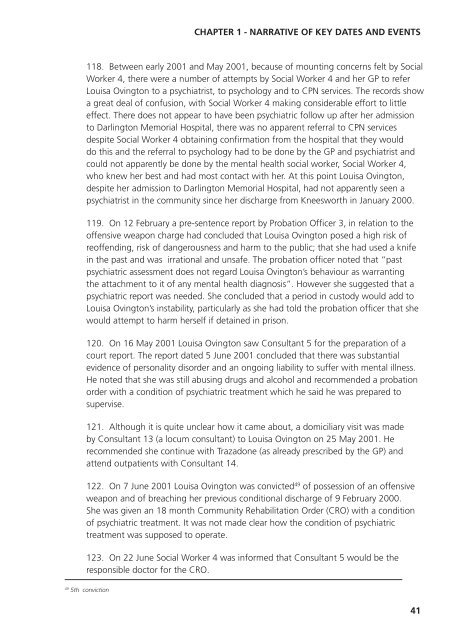Lousia Ovington independent investigation report ... - NHS North East
Lousia Ovington independent investigation report ... - NHS North East
Lousia Ovington independent investigation report ... - NHS North East
You also want an ePaper? Increase the reach of your titles
YUMPU automatically turns print PDFs into web optimized ePapers that Google loves.
CHAPTER 1 - NARRATIVE OF KEY DATES AND EVENTS<br />
118. Between early 2001 and May 2001, because of mounting concerns felt by Social<br />
Worker 4, there were a number of attempts by Social Worker 4 and her GP to refer<br />
Louisa <strong>Ovington</strong> to a psychiatrist, to psychology and to CPN services. The records show<br />
a great deal of confusion, with Social Worker 4 making considerable effort to little<br />
effect. There does not appear to have been psychiatric follow up after her admission<br />
to Darlington Memorial Hospital, there was no apparent referral to CPN services<br />
despite Social Worker 4 obtaining confirmation from the hospital that they would<br />
do this and the referral to psychology had to be done by the GP and psychiatrist and<br />
could not apparently be done by the mental health social worker, Social Worker 4,<br />
who knew her best and had most contact with her. At this point Louisa <strong>Ovington</strong>,<br />
despite her admission to Darlington Memorial Hospital, had not apparently seen a<br />
psychiatrist in the community since her discharge from Kneesworth in January 2000.<br />
119. On 12 February a pre-sentence <strong>report</strong> by Probation Officer 3, in relation to the<br />
offensive weapon charge had concluded that Louisa <strong>Ovington</strong> posed a high risk of<br />
reoffending, risk of dangerousness and harm to the public; that she had used a knife<br />
in the past and was irrational and unsafe. The probation officer noted that “past<br />
psychiatric assessment does not regard Louisa <strong>Ovington</strong>’s behaviour as warranting<br />
the attachment to it of any mental health diagnosis”. However she suggested that a<br />
psychiatric <strong>report</strong> was needed. She concluded that a period in custody would add to<br />
Louisa <strong>Ovington</strong>’s instability, particularly as she had told the probation officer that she<br />
would attempt to harm herself if detained in prison.<br />
120. On 16 May 2001 Louisa <strong>Ovington</strong> saw Consultant 5 for the preparation of a<br />
court <strong>report</strong>. The <strong>report</strong> dated 5 June 2001 concluded that there was substantial<br />
evidence of personality disorder and an ongoing liability to suffer with mental illness.<br />
He noted that she was still abusing drugs and alcohol and recommended a probation<br />
order with a condition of psychiatric treatment which he said he was prepared to<br />
supervise.<br />
121. Although it is quite unclear how it came about, a domiciliary visit was made<br />
by Consultant 13 (a locum consultant) to Louisa <strong>Ovington</strong> on 25 May 2001. He<br />
recommended she continue with Trazadone (as already prescribed by the GP) and<br />
attend outpatients with Consultant 14.<br />
122. On 7 June 2001 Louisa <strong>Ovington</strong> was convicted 49 of possession of an offensive<br />
weapon and of breaching her previous conditional discharge of 9 February 2000.<br />
She was given an 18 month Community Rehabilitation Order (CRO) with a condition<br />
of psychiatric treatment. It was not made clear how the condition of psychiatric<br />
treatment was supposed to operate.<br />
123. On 22 June Social Worker 4 was informed that Consultant 5 would be the<br />
responsible doctor for the CRO.<br />
49 5th conviction<br />
41
















